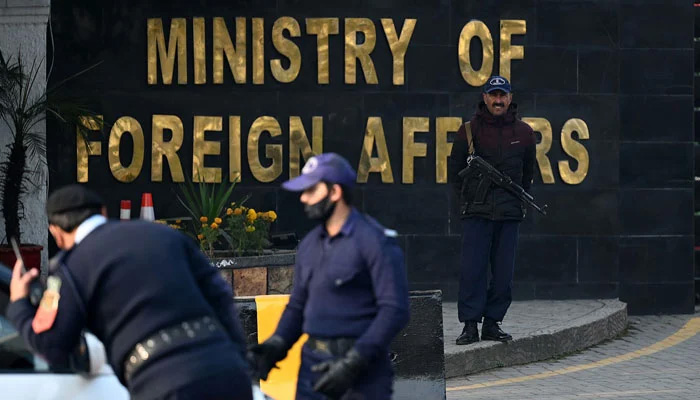

- Attack carried out by Gul Bahadur group based in Afghanistan: FO.
- Says "such incidents also go against spirit of bilateral relations."
- "Bannu attack poses serious threat to regional peace, security".
Pakistan on Wednesday issued a "strong demarche" to Afghanistan following a deadly terrorist attack on Bannu Cantonment two days ago which resulted in the martyrdom of eight soldiers and injured many others.
At least eight Pakistan Army soldiers had embraced martyrdom as security forces effectively thwarted a terrorist attack at Bannu Cantonment killing all 10 militants two days ago, the Inter-Services Public Relations (ISPR) said in a statement on Tuesday.
The terrorists attacked the Bannu Cantonment in the early hours of July 15 but their attempt to enter the facility was effectively thwarted by the security forces personnel, resultantly the militants rammed an explosive-laden vehicle into the perimeter wall of the cantonment, the military’s media wing had said.
In a statement today, the Foreign Office said the deputy head of mission of the embassy of Afghanistan in Islamabad was summoned to the Ministry of Foreign Affairs today to deliver Pakistan’s strong demarche over the deadly terrorist attack on Bannu Cantonment.
The FO said the terrorist attack was carried out by the Hafiz Gul Bahadur group based in Afghanistan. The militant group along with Tehreek-e-Taliban Pakistan (TTP), is responsible for the deaths of hundreds of civilians and law enforcement officials in multiple terrorist attacks inside Pakistan, the statement added.
Islamabad urged Kabul to “fully investigate and take immediate, robust and effective action against the perpetrators of the Bannu attack and to prevent the recurrence of such attacks against Pakistan using the territory of Afghanistan”.
Pakistan reiterated its serious concerns over the presence of terror outfits inside Afghanistan that continue to threaten Pakistan's security. "Such incidents also go against the spirit of bilateral relations between the two brotherly countries," it read.
The FO spokesperson added that the “Bannu Cantonment attack is yet another reminder of the serious threat posed by terrorism to regional peace and security”.
Reiterating the call for decisive action against terrorism, the statement said Pakistan "remains steadfast in its commitment to combat this menace and to uphold its security against all threats".
'Major catastrophe prevented'
The ISPR had said that the Bannu suicide blast led to the collapse of a portion of the wall and damaged the adjoining infrastructure, resulting in the martyrdom of eight brave sons of soil.
"This timely and effective response by the security forces prevented a major catastrophe, saving precious innocent lives. The gallant and selfless action of the security forces is a testament to their unrelenting resolve in the fight against terrorism," read the statement.
The attack, as per the ISPR, was carried out by the Hafiz Gul Bahadur group operating from Afghanistan and has used the neighbouring country's territory to carry out terrorist attacks inside Pakistan in the past as well.
It is to be noted that Pakistan, back in November 2023, had summoned the head of the Afghan diplomatic mission in Islamabad and demanded the extradition of terrorist Gul Bahadur — the leader of a faction of the outlawed TTP.
Bannu Cantt attack comes as Islamabad time again called on the Afghan Taliban administration in Kabul to prevent its soil from being used by various banned outfits responsible for terrorist attacks against Pakistan.
Last month, the government approved the launching of operation "Azm-e-Istehkam", a renewed national anti-terror drive, in light of the surge in terrorist attacks in the country in recent months.
The country, during the second quarter of 2024 witnessed 380 violence-linked fatalities and 220 injuries among civilians, security personnel, and outlaws, resulting from as many as 240 incidents of terror attacks and counter-terror operations, said a Security Studies (CRSS) Annual Security report.
This includes 236 fatalities among civilians and security forces personnel, the report said.
Khyber Pakhtunkhwa (KP) and Balochistan provinces – both bordering Afghanistan, were the epicentres of violence, accounting for nearly 92% of all fatalities and 87% of attacks (including incidents of terrorism and security forces operations) during this period.
Individually, the former suffered 67% and the latter 25% of all fatalities in Q2, 2024.












